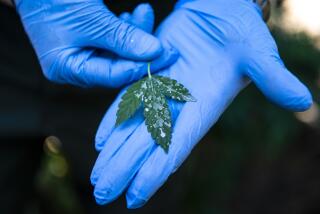Fruit Ban Amid Poisoning Scare Proper, GAO Decides
- Share via
WASHINGTON — The Food and Drug Administration acted appropriately and within its legal authority in responding to the March, 1989, Chilean grape poisoning scare, the General Accounting Office has concluded in a draft report obtained Tuesday by The Times.
The investigation was requested last year by Sen. Jesse Helms (R-N.C.), who was concerned about the economic impact of the FDA’s actions. The congressional watchdog agency’s draft report was completed in August but has not yet been released by Helms’ office.
The FDA has been accused in some quarters of overreacting when it suspended imports of all Chilean fruits for five days after discovering three Chilean grapes that were tainted with cyanide.
The GAO report did not address the question of who actually had poisoned the grapes or where the tampering occurred, mysteries that remain unsolved.
The international scare began when an unidentified person called the U.S. Embassy in Santiago on two separate occasions, claiming to have poisoned with cyanide fruit that was being shipped to the United States.
Upon finding the three contaminated grapes, the FDA took a series of actions that included suspending Chilean fruit imports for five days. The agency also warned the American public not to eat Chilean fruit and recommended that retail and wholesale outlets remove the fruit from distribution.
“FDA’s actions were consistent with the Federal Food, Drug and Cosmetic Act, which requires that imported food be denied entry to the United States when . . . evidence indicates that the food appears to be adulterated,” the report said. “The act also allows the FDA to issue public warnings if an imported food presents a health hazard.”
The GAO also noted that the FDA decided to suspend imports after extensive consultation with other federal agencies, including the State and Agriculture departments, even though it was not required to engage in such discussions.
The Chilean fruit industry said the episode cost that nation’s economy $333 million. But the damage apparently was not permanent, since Chilean fruit imports to the United States a year after the incident “reached an all-time high,” the GAO said.
In conducting the inquiry, the GAO said it interviewed and obtained information from former FDA Commissioner Frank E. Young and other agency officials, the Customs Service, the Agriculture Department, the Federal Bureau of Investigation, the State Department, the Chilean Exporters Assn. and import firms.
Further, the agency said, it used four outside consultants to evaluate the FDA’s testing and sample protection methods “and to assess the reliability of FDA’s findings.”
The GAO said the FDA “used two widely accepted tests and conducted them in accordance with sound scientific methods.”
More to Read
Sign up for Essential California
The most important California stories and recommendations in your inbox every morning.
You may occasionally receive promotional content from the Los Angeles Times.













